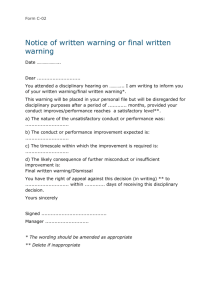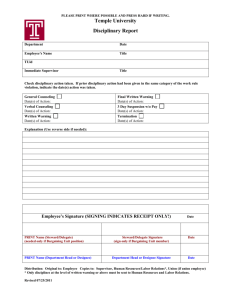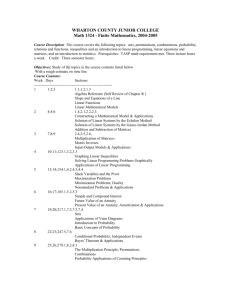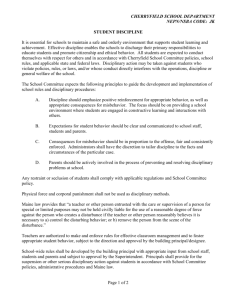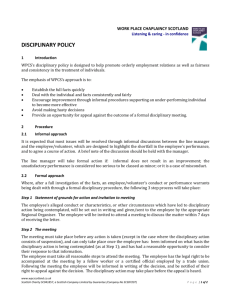Keighley Voluntary Services Ltd will appoint a sub committee of the
advertisement
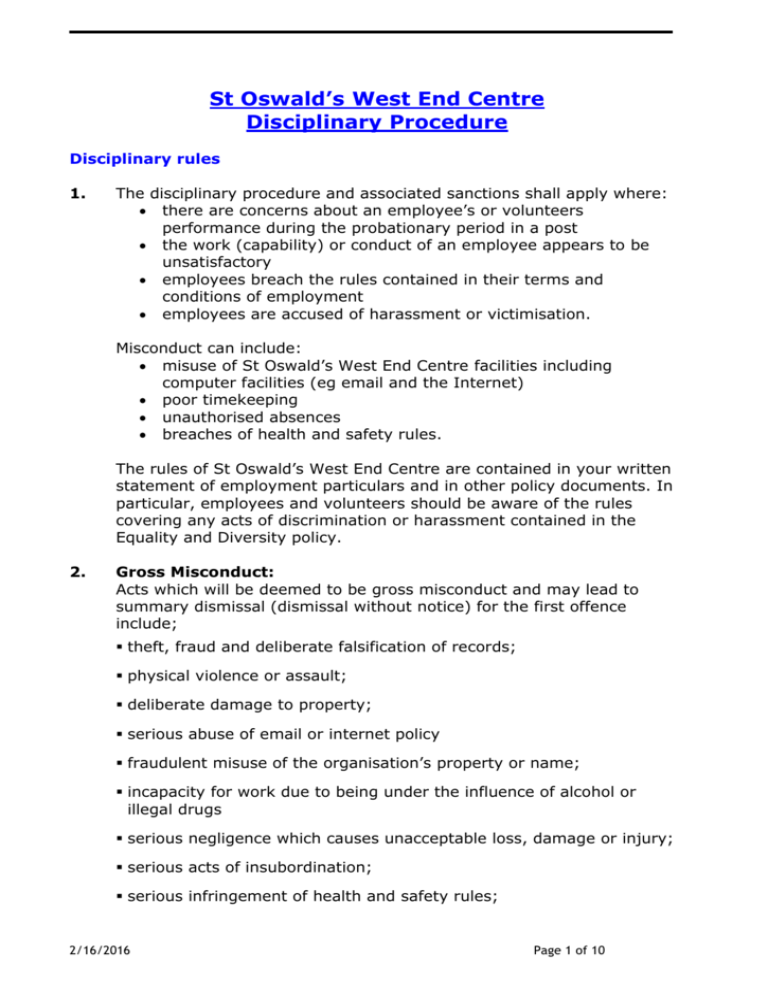
St Oswald’s West End Centre Disciplinary Procedure Disciplinary rules 1. The disciplinary procedure and associated sanctions shall apply where: there are concerns about an employee’s or volunteers performance during the probationary period in a post the work (capability) or conduct of an employee appears to be unsatisfactory employees breach the rules contained in their terms and conditions of employment employees are accused of harassment or victimisation. Misconduct can include: misuse of St Oswald’s West End Centre facilities including computer facilities (eg email and the Internet) poor timekeeping unauthorised absences breaches of health and safety rules. The rules of St Oswald’s West End Centre are contained in your written statement of employment particulars and in other policy documents. In particular, employees and volunteers should be aware of the rules covering any acts of discrimination or harassment contained in the Equality and Diversity policy. 2. Gross Misconduct: Acts which will be deemed to be gross misconduct and may lead to summary dismissal (dismissal without notice) for the first offence include; theft, fraud and deliberate falsification of records; physical violence or assault; deliberate damage to property; serious abuse of email or internet policy fraudulent misuse of the organisation’s property or name; incapacity for work due to being under the influence of alcohol or illegal drugs serious negligence which causes unacceptable loss, damage or injury; serious acts of insubordination; serious infringement of health and safety rules; 2/16/2016 Page 1 of 10 serious breach of confidentiality, serious breach of St Oswald’s West End Centre’s Equality and Diversity policy any other acts which are deemed to be of sufficient seriousness as to constitute gross misconduct. Disciplinary procedures 1. Introduction St Oswald’s West End Centre’s aim is to encourage all employees to maintain standards in individual conduct and work. This procedure sets out the action which will be taken in response to cases of alleged misconduct and poor work performance. The procedure is designed to establish the facts quickly and to deal consistently and fairly with any disciplinary issues. Where disciplinary action is being considered the employee will be informed in advance. No disciplinary action will be taken until the matter has been fully investigated. No disciplinary sanction will be taken against an employee until the individual has been given an opportunity to state their case at a disciplinary meeting. With the exception of acts that may be deemed as gross misconduct, will attempt to deal with concerns informally through its normal management procedures prior to commencing formal disciplinary action. Meetings will be held in private and the need for confidentiality must be respected at all stages. St Oswald’s West End Centre’s Management Committee reserves the right to involve individuals from outside the organisation to assist with investigation. Any such third parties will agree to be bound to respect confidentiality. Where an employee has a recognised disability, appropriate reasonable adjustments will be made to the procedure. This might involve, for instance, allowing a reader or sign language interpreter to attend, or giving assistance with written submissions. 2. Failure of probationary period – simplified procedure Where an employee’s performance is not considered to be satisfactory in spite of support and clear targets for improvement at any time during the probationary period, but particularly at either the 3 month or the 6 month review stages or at the end of an extended probationary period, the contract may be terminated. 2/16/2016 Page 2 of 10 Where termination is a possibility, the employee will be informed in writing that a meeting is to be held to discuss concerns about performance and that this could result in dismissal. The meeting will be conducted by the employee’s line manager and the Manager, unless this is the same person in which case a Trustee will also be present. The employee will be entitled to bring a mutually accepted person of their choice to this meeting. The employee will be informed of the outcome of the meeting in writing and given a chance to appeal. The employee may bring a mutually agreed companion of their choice to the appeal hearing. The appeal will be heard by the Chair or Deputy Chair of the Management Committee and their decision will be final. 3. Employee / Volunteer Capability If a line manager has concerns about the capability of an employee to perform the duties of the post for which they are employed to a satisfactory standard, they will ensure that these issues are first addressed through the organisation’s performance management and appraisal procedures or sickness procedures. This will include identifying sources of training for staff and/or considering other ways of performing the necessary work. It will also include identification of work areas where improvement is needed and detailing the improvement required, along with the timescale in which this improvement is to take place and the ways in which this will be measured. Where a line manager has addressed issues of concern in line with the supervision and appraisal procedures or sickness procedures and there is no significant improvement in work standard, the line manager will invoke the disciplinary procedure. 4. Responsibility for action and appeal at each stage This procedure has been designed to ensure that those responsible for initiating disciplinary action through the various stages are clearly identified and that employees can appeal to an appropriate group of people at each stage of the process. The responsible person or body is identified in the grid below. 5. The Disciplinary Hearing Employees will be informed of the date of the disciplinary hearing in writing and no less than 5 days notice will be given. The employee will be informed of the details of the accusations and to see supporting documentation (statements or other written evidence), the names of the panel and any witnesses that may be called. The employee will be informed of the possible sanction. In cases of possible gross misconduct the employee will be informed of this and told that the likely sanction is dismissal. Employees have the right to be accompanied or represented by a mutually agreed person of their choice at all disciplinary meetings. 2/16/2016 Page 3 of 10 Disciplinary hearings will be conducted by the responsible party, as outlined in the grid below. At the meeting, the disciplinary panel will outline the complaint against the employee and go through the evidence that has been gathered. The employee will be allowed to set out their case and answer any allegations that have been made. The employee will also be allowed to ask questions, present evidence, call witnesses and raise points about any information provided by witnesses. In cases of harassment or personal abuse / assault, the disciplinary panel must make appropriate arrangements to protect the personal safety of any witnesses. [Please see St Oswald’s West End Centre’s Equality and Diversity Policy (Appendix, titled ‘Harassment’) for more detail on dealing with allegations of harassment. A neutral party (not a member of the panel) will be appointed to take minutes and a copy will be provided to the person been disciplined. If either the employee or their companion is not available to attend the meeting on the proposed date, the meeting may be postponed to a mutually convenient time proposed by the employee which must be no more than 5 working days after the day originally proposed by St Oswald’s West End Centre’s If either side for good reason fails to attend an agreed meeting, the meeting may be rearranged once. Any subsequent agreed meeting may proceed without the person who is unable to attend. Following the meeting the disciplinary panel will decide whether disciplinary action is justified or not. Where it is decided that no action is justified the employee will be informed. Where it is decided that disciplinary action is justified the panel will decide what form this should take. Before making any decision account should be taken of the employee’s disciplinary and general record, length of service, actions taken in any previous similar case, the explanations given by the employee and whether the intended disciplinary action is reasonable in the circumstances. 6. Composition of Disciplinary Panels Post Holder Staff excluding the Manager Manager Members of the Board 2/16/2016 Responsible Person [Manager/ member of the Board] Member of the Board of Trustees Member of the Board of Trustees Panel to include 1 (other) member of the Board of Trustees 1 other member of the Board of Trustees 1 other member of the Board of Trustees Page 4 of 10 No-one may sit as a panel member who is implicated in the complaint or in the investigation or who is likely to be called as a witness. The Chairperson should not be involved at an early stage in any disciplinary hearing in case they are needed as part of the appeal process. (See below for composition of Appeal Panel.) The format for the hearing will be as follows: The person or body responsible for initiating the disciplinary action and any Investigating Officer will present their reasons for the disciplinary action and may call witnesses or present other evidence to the panel as appropriate. The employee may present their case to the panel, calling witnesses and presenting other evidence as appropriate to the case. In cases of harassment or personal abuse / assault, the disciplinary panel must make appropriate arrangements to protect the personal safety of any witnesses. The disciplinary panel may adjourn to consider evidence or undertake further investigation as appropriate. Once all evidence has been presented from both sides the disciplinary panel will consider the evidence and determine whether disciplinary sanctions will be imposed and the level of sanction as identified below. The employee will be informed of the results of the disciplinary hearing and the reasons for the decision as soon as possible. This will be confirmed in writing. No person directly involved in any allegation of misconduct or who is a significant witness in the case may be a member of the disciplinary panel. 7. Disciplinary Sanctions: There will be four possible sanctions that may be imposed as a result of a disciplinary hearing; each designed to cover varying degrees of seriousness of the case and also to give a proper sequence for persistent cases. The disciplinary panel may impose any level of sanction, as it deems necessary, depending on the severity of the case. 7.1 First Warning: Where the case is of sufficient seriousness or, in the case of capability concerns, where the employee is not showing the required improvement in work performance, a first warning will be given. Notes of the warning will be placed on the employee’s record, where they will be kept for three months and a copy given to the employee. The employee will be advised that the warning constitutes the first formal sanction of the disciplinary process. The nature of the offence and the likely consequences of further offences or a failure to improve 2/16/2016 Page 5 of 10 within the specified timescale will be explained to the employee. The employee will be informed of their right of appeal. 7.2 Written Warning: Where the case has already involved the first warning stage and insufficient improvement has been made, or where the case is of sufficient seriousness, a formal written warning will be given. The written warning will include: – a) the decision to issue the warning; b) the cause or nature of the offence(s); c) action required of the employee, including details of work performance improvements required in the case of action relating to capability d) time scale in which improvement is expected; e) any assistance which the employer may make available; f) the right of appeal; g) the length of time the warning will remain on file h) the likely consequences of further offences or a failure to improve within the specified timescale. Written warnings will remain on file for 6 months. 7.3 Final Warning: Where the case has already involved the written warning stage and insufficient improvement has been made, or where the case is of sufficient seriousness, a final warning will be given. The final warning will cover the same information as contained in the written warning, together with a statement that the consequences of further misconduct or insufficient improvement will be dismissal. The final warning will remain on file for 9 months. 7.4 Dismissal: Where the case has already involved the final warning and insufficient improvement has been made, or where the case is of sufficient seriousness to constitute gross misconduct, the employee may be dismissed. No decision to dismiss will be made without holding a formal disciplinary meeting at which the employee has the opportunity to present their case in line with the ACAS Code of Practice. These procedures entail: a) Writing to the employee to invite them to a disciplinary meeting, with a mutually acceptable companion/representative if they so wish, stating the nature of the offence and telling them that dismissal may result; b) Holding the meeting, in line with procedures outlined above; c) Informing the employee in writing of the outcome of the meeting and of their right to appeal. 2/16/2016 Page 6 of 10 This procedure will be followed in all cases, including dismissal during the probationary period, dismissal for gross misconduct, dismissal for incapacity, repeated misconduct or breach of contract. Termination on grounds of redundancy or expiry of a fixed term contract will also follow the above statutory procedure but the emphasis will be on explanation and confirmation of the situation, thanking the employee for their service and asking for any comments relevant to an “exit interview”. Termination of contract on grounds of retirement will be dealt with separately as outlined in the Written Statement of Employment Particulars. 8. Investigation: Where an employee is subject to allegations that may make it necessary to invoke the disciplinary process, or where an employee is suspected of having committed gross misconduct, a full investigation will be carried out prior to any disciplinary hearing. The employee may be suspended with pay during this period (see below). All employees are required to contribute to any investigation where requested, whether suspended or not. An Investigating Officer appointed by the Chair and/or Vice Chair of the Management Committee will carry out the investigation. The Investigating Officer will not be someone who is responsible for the decision to dismiss or is involved in the appeal procedure, and may be an external party brought in for the purposes of conducting the investigation. 9. Suspension: In cases where there is reasonable ground for suspecting that an employee is subject to an allegation of gross misconduct, or where it is considered necessary to enable an investigation to be undertaken the employee will be suspended on full pay while the case is investigated. The decision to suspend will be made by the employee’s line manager in consultation with the Chair and/or Vice Chair of the Management Committee. The terms of suspension will be conveyed to the employee in writing. During any time of suspension, the employee is required to surrender their keys to any of the employer's premises, and to comply with any conditions of suspension. On completion of the investigation, a disciplinary hearing will be held as soon as is practicable. The employee will remain suspended during the period of the disciplinary hearing, which may include additional periods of investigation subject to the decisions of the disciplinary panel. A decision to suspend an employee is not a disciplinary sanction and will not be counted as such nor held on file as such. Employees will not be warned in advance of a decision to suspend. 10. Appeal 2/16/2016 Page 7 of 10 The right to appeal shall apply to all outcomes of a disciplinary hearing and shall be exercised by the employee writing to the Chair of the Management Committee within 14 days of notification of the decision, giving the grounds of the appeal. Any appeal will be held as soon as practicable following receipt of the appeal letter. The appeal hearing may take place before or after disciplinary action or dismissal has taken effect. Employees have the right to be accompanied [or represented] by a person of their choice at all appeal hearings. Appeals will be heard by the responsible party, as outlined in the grid below. The format for the appeal will be as follows: The person or body responsible for initiating the disciplinary action and any Investigating Officer will present their reasons for the decision to the appeal body. The employee may present their case to the appeal body. Both sides may call witnesses to support their case. In cases of harassment or personal abuse / assault, the appeal body must make appropriate arrangements to protect the personal safety of any witnesses. The appeal body can make the following decisions: To uphold the first decision against which the appeal is made To uphold the appeal To vary the sanction imposed by the disciplinary panel – eg to change a final warning to a written warning In the case of dismissal, to uphold the appeal not to dismiss but to vary the sanction imposed The employee will be informed of the results of the appeal and the reasons for the decision as soon as possible and this will be confirmed in writing. No person directly involved in any allegation of gross misconduct, a significant witness or anyone who has been involved in previous decisions will take part as a member of any appeal body. Decisions of appeal bodies are final and there is no further appeal. 11. Responsibility Grid - Appeals: The person or bodies responsible for initiation and appeal at each stage are as follows: STAGE First warning ACTIONED BY Line Manager Written warning Line Manager Final warning Line Manager in consultation with the 2/16/2016 APPEAL 2 members of the Board of Trustees, not involved in the disciplinary hearing As above, not involved in any previous disciplinary hearing As above, not involved in any previous disciplinary Page 8 of 10 Dismissal 12. [Manager/member of the Board of Trustees] Chairperson in consultation with the [Manager/Vice Chairperson] hearing 2 members of the Board of Trustees not previously involved in the disciplinary hearings or appeals. Right to be accompanied: All employees are entitled by law to be accompanied by a trade union representative or work colleague choice during any disciplinary hearing. Over and above this, St Oswalds West End Centre’s will accept any mutually agreed person of the employee’s choice as a companion or as a representative. There is no duty on a fellow worker to accept a request to accompany a work colleague and no pressure should be brought to bear on a person if they do not wish to act as a companion. A worker who has been requested to accompany a colleague and has agreed to do so will be permitted to take a reasonable amount of paid time off to fulfil this responsibility. St Oswalds West End Centre’s will also allow a reasonable amount of time off for the accompanying person to confer with the worker before and after the hearing. case".) Related policies Written Statement of Employment particulars Equality and Diversity Policy Absence management policy Further Guidance for handing disciplinary procedures Acas publications: 1) Self help guide: Producing Disciplinary and Grievance Procedures www.acas.org.uk: follow links to Our Publications and Self help guides 2) Advisory handbook: Discipline and Grievances at Work www.acas.org.uk: follow links to Our Publications and Advisory handbooks. 3) Code of Practice on Disciplinary and Grievance Procedures www.acas.org.uk: follow links to Our Publications and Codes of Practice. The first section, up to page 20, is especially helpful. Model letters/forms for all stages of a disciplinary process are at: http://www.acas.org.uk/index.aspx?articleid=392 DTI web site 2/16/2016 Page 9 of 10 http://www.dti.gov.uk/employment/Resolving_disputes/statutory-disputeresolution/index.html 2/16/2016 Page 10 of 10


